Preface
Reminiscences of a Stock Operator is a pretty old book (1923) that tells the story of Jesse Livermore, a very successful speculator in the markets of that time. The age of the book only makes it more impressive how its teachings can still be applied today to markets that look completely different from the markets of old. This quote from the book illustrates what I want to say:
Nowhere does history indulge in repetitions so often or so uniformly as in Wall Street. When you read contemporary accounts of booms or panics the one things that strikes you most forcibly is how little either stock speculation or stock speculators to-day differ from yesterday. The game does not change and neither does human nature.
This is the third part of my series of articles about this book. The shortest one where I will focus on the story of the "old Turkey" and the things we can learn from it. You can find the links to the previous articles about the book at the bottom of this article.
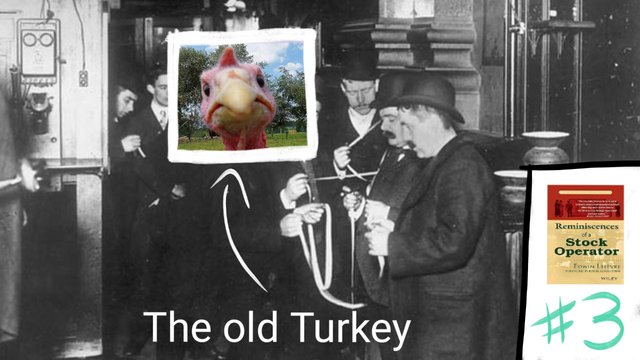
Tape reading in the old days. "Slightly" adapted version from source.
The old Turkey
The story of the old Turkey is a small part of the book Reminiscences of a Stock Operator that is told on chapter 5. It's a short story, but one that can teach us a lot about markets and speculation.
The old Turkey's name was actually Partridge, and he was an old man that was different from the other speculators he interacted with. Turkey was how other people nicknamed him (behind his back) based on the way he walked.
He was different in the sense that he was calm, attentive and, especially, in the way he never asked for tips and never volunteered any. He would accept tips and advices from his peers and thank them politely, but he would never ask them for it or whine if the market went against the tip he got. He would listen to everyone politely and answer when questioned or asked for tips, but he would also never proactively offer them.
When asked what he thought about the market or the way a stock was acting he would usually answer with "You know, it's a bull market!" That became his trademark and an expression that many would wonder about without knowing its true meaning.
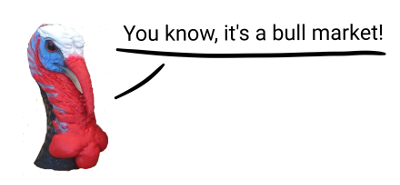
The book focuses on a talk between a man named Elmer and the old Turkey, when Elmer rushes to the old Turkey to tell to him to sell some stocks he himself had tipped the old Turkey to buy. Elmer claimed a correction was coming and he should sell the stocks to buy again later on at a better price. The old Turkey keeps his temper as always and just answers with: "Why, this is a bull market! …If I sold that stock now I'd lose my position; and then where would I be?" Elmer is flabbergasted and thinks the old Turkey is worried about losing his job. The talk ends with the paragraph I'll quote bellow, that greatly describes the thoughts of the old Turkey:
I didn't say I'd lose my job," cut in old Turkey. "I said I'd lose my position. And when you are as old as I am and you've been through as many booms and panics as I have, you'll know that to lose your position is something nobody can afford; not even John D. Rockefeller. I hope that stock reacts and that you will be able to purchase your line at a substantial concession, sir. But I myself can only trade in accordance with the experience of many years. I paid a high price for it and I don't feel like throwing away a second tuition fee. But I am as much obliged to you as if I had the money in the bank. It's a bull market, you know.
What we can learn from it
There are several aspects that make the story of the old Turkey an inspiration for me. I'll start with the most obvious one: trend following. And the best description to it can be taken directly from the words of the author himself:
I think it was a long step forward in my trading education when I realized at last that when old Mr. Partridge kept on telling the other customers, "Well, you know this is a bull market!" he really meant to tell them that the big money was not in the individual fluctuations but in the main movements -- that is, not in reading the tape but in sizing up the entire market and its trend.
No one can get all the fluctuations of the market right, no matter how good they are at trading. This is something old traders repeat over and over again. Having anything close to a 50% win rate in your trade history is amazing. In other words, you will very likely have more losing trades than winning trades. All that matters is how much you win and lose in those trades.
If you're a day trader, you will need to follow shorter time frames, it's part of the job. But for everyone else, focusing on the long term trends will very likely make you more profitable. Moreover, it has other effects that can also influence your trading: you will be calmer, do less trades, have more time to think, reflect and evaluate your trades, and more time to follow your plan. Assuming you have a plan that works, following long term trends can bring you several benefits.
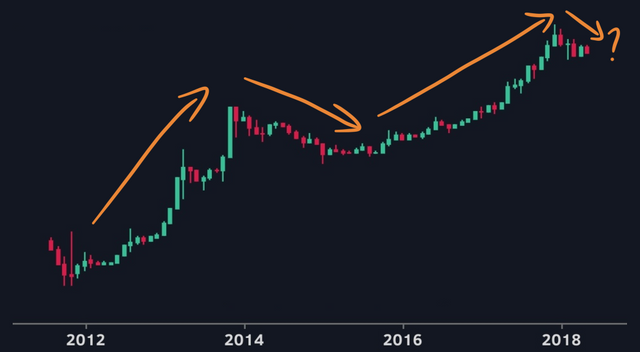
BTC monthly bars in log scale. Looking at bigger time frames you can see huge trends that take years to develop.
It sounds simple, right!? But it's something quite hard to follow. I'll take another quote from the book that illustrates it:
It never was my thinking that made the big money for me. It was always my sitting. Got that? My sitting tight! … Men who can both be right and sit tight are uncommon. I found it one of the hardest things to learn.
So being right in the market (in other words, having a plan that works and being able to identify trends) is obviously necessary if you want to be profitable. But that's not enough, that's when all the psychological factors will start playing with you. Being right and then being able to sit tight and let your plan develop is hard even for experienced traders.
In crypto it seems like everything happens way faster than in other markets. That's clear to see when you look at all the fluctuations of the altcoins in the past 1-2 years. But the idea of following the main trends is still valid. You don't need to sell at every reaction during an altseason and rebuy lower; you just need to be able to detect the start and the end of an altseason. I'm not saying this is easy, but it makes things much simpler than being obsessed with charts and price movements and thinking you have to be trading every day or you will lose.

Trade your plan and sit on it. Literally, if you will.
Another aspect I like in the old Turkey is the way he behaves towards people. He's calm, he's gentle, he listens more than he talks. He just sounds like a nice human being. It might sound corny, but I do think that being nice to others does make other people be nice to you. It's not wishful thinking or a belief that "the universe works this way", it's more a psychological aspect I believe in. Psychological biases people unknowingly follow.
We live in what many people call "the age of information." There's so much information out there and, with social media, so many people exposing their opinions that it's impossible to follow everything. If you look at what people call "crypto Twitter" -- the "section" of Twitter composed by people that talk about cryptocurrencies -- you will be flooded by charting tips, bragging, coin shills, fake news, real news, personal opinions, and everything else you can imagine. It's overwhelming indeed!
But take it as listening to people; when you're reading a tweet, you are just listening to someone voice their opinion. You don't need to follow their tip; you don't need to believe their news; you certainly don't need to respond at all. Just "listen." After all, everything is knowledge and experience that you will add to your backpack and that will pay out some day in the future.
Learn to separate what's real from what's not, what can help you improve from what will just waste your time. Again, this is not easy! But as you accumulate knowledge, just like in charts, patterns will start repeating and things will look clearer. Filter through all the FUD and the bragging (crypto Twitter loves to brag, it sounds like they never do anything wrong) for what has actual informational value. But listen to it all; everything can help you understand how people think and behave.
At the end of the day it will be up to you to learn from you own experience. That plan I was talking about, it must be your plan. Yeah, in the beginning you will want to follow other people's tips because you believe they know more than you (they might really do), and that's ok. But use that to learn, not to just chase easy profits. Thank them if it works out; don't complain if it doesn't. After all it was you that made the choice to follow it.
This is the last of the three articles of my quote-based takeaways from the book Reminiscences of a Stock Operator. Hope you enjoyed them!
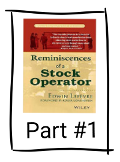
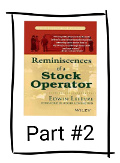
You can also check other of my posts at:
- Capital preservation and the 2%
- Moving Averages (SMA, EMA): How to use and calculate them (spreadsheet and code included
- An all too ordinary story of an inexperienced crypto trader (#2)
Disclaimer: This is not financial advice, I write for informational and educational purposes only. This article expresses solely my opinion, make of it what you wish.
Hi @jwyles, I just stopped back to let you know your post was one of my favourite reads and I included it in my Steemit Ramble. You can read what I wrote about your post here.
Join us on Thursdays for Pimp Your Post Thursday at 11am EDT or 7PM EDT in the Steemit Ramble Discord or:
If you’d like to nominate someone’s post just visit the Steemit Ramble Discord. If I use the post, you earn a portion of the rewards.
Pimp Your Post Thursday is a live curation show where you get to know others and they you. You can promote your post or someone you think needs more notice.
Downvoting a post can decrease pending rewards and make it less visible. Common reasons:
Submit
Hi, thanks!
Interesting service you provide. Curation is really important nowadays, and I feel it's even more needed on Steemit, where it seems really hard to find good content.
Will start following your posts and community :)
Downvoting a post can decrease pending rewards and make it less visible. Common reasons:
Submit
thank you @jwyles, I've been doing the Steemit Ramble since August 2016... i just recently moved it to its own account. Hang in there posting consistent good content and you'll build up. Sometimes it will just seem like it takes forever.
Downvoting a post can decrease pending rewards and make it less visible. Common reasons:
Submit
Resteemed to over 18600 followers and 100% upvoted. Thank you for using my service!
Send 0.200 Steem or 0.200 Steem Dollars and the URL in the memo to use the bot.
Read here how the bot from Berlin works.
#resteembot #bestofresteembot #winwithresteembot
Feel free to join our partner crypto exchange: https://www.binance.com/?ref=10230705.
@resteem.bot
Downvoting a post can decrease pending rewards and make it less visible. Common reasons:
Submit
Your post was resteem by Whale ResteemService @booster007 & @boostupvote
Keep it up!
All the best!
Send 0.100 SBD/steem For resteem over 4800+ followers / send 0.200 SBD/steem resteem over 11,300+ Follwers Send your link in memo ! @boostupvote Attached !
Downvoting a post can decrease pending rewards and make it less visible. Common reasons:
Submit
Downvoting a post can decrease pending rewards and make it less visible. Common reasons:
Submit
Your Post Has Been Featured on @Resteemable!
Feature any Steemit post using resteemit.com!
How It Works:
1. Take Any Steemit URL
2. Erase
https://3. Type
reGet Featured Instantly & Featured Posts are voted every 2.4hrs
Join the Curation Team Here | Vote Resteemable for Witness
Downvoting a post can decrease pending rewards and make it less visible. Common reasons:
Submit